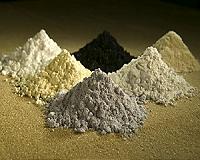 |
Tokyo (AFP) Oct 22, 2010 Japan and Vietnam are set to agree on joint development of rare earth minerals this month as countries scramble to secure supplies after a squeeze by China, a report said Friday. Japanese Prime Minister Naoto Kan and his Vietnamese counterpart Nguyen Tan Dung are expected to agree on the joint development plan in their meeting on October 31, with Japan providing exploration and smelting technologies for mining in Vietnam, the business daily Nikkei reported, without citing sources. The report comes after China stopped shipments of rare earth minerals to Japan last month amid a simmering diplomatic row that began when Tokyo arrested a Chinese trawlerman in disputed waters. Japan's stockpile of rare earth minerals, used in the manufacture of high-tech goods, could dry up by March or April without fresh imports from China, a senior Japanese government official warned Thursday. China, which controls more than 95 percent of the global market, has not officially declared an export ban, but all 31 Japanese companies handling rare earth minerals have reported disruption to shipments. Japanese trading houses Toyota Tsusho and Sojitz are working with the Vietnam National Coal, Mineral Industries Holding Corp., or Vinacomin, to prepare for the development of a rare-earth mine in Vietnam, the report said. The project will likely start moving once the leaders of the two countries sign the cooperation agreement in Hanoi, it said. Another major trading house, Sumitomo, has also launched a feasibility study on a mine in the northern Vietnamese province of Yen Bai, looking to begin exporting to Japan as early as 2013, it said. The projects of Sumitomo and the Toyota Tsusho-Sojitz alliance will yield at least 7,000 tonnes a year of rare earth minerals, enough to meet more than 20 percent of demand in Japan. Initial investment for the two projects is estimated at roughly 200 million dollars, it said. Japanese ministers have said Tokyo will try to secure more mining development rights overseas to diversify supplies of rare earth minerals, while seeking alternatives to the minerals, which are now almost exclusively produced by China.
earlier related report Part of President Barack Obama's Food, Conservation, and Energy Act of 2008, the Biomass Crop Assistance Program (BCAP) is a "national imperative" to assist the biofuels industry, Agriculture Secretary Tom Vilsack told the National Press Club. "By producing more biofuels in America, we will create jobs, combat global warming, replace our dependence on foreign oil and build a stronger foundation for the 21st century economy," he added. The US Department of Agriculture said BCAP "provides assistance for the establishment and production of eligible renewable biomass crops," a statement said. The program provides up to 75 percent of the cost of establishing eligible perennial crops, as well as matching payments for transportation of eligible materials sold to qualified biomass conversion facilities. "The Obama administration is aggressively supporting our nation's farmers, ranchers and producers of biofuels as they work to bring greater energy independence to America," Vilsack said. He also announced a five-year agreement with the Federal Aviation Administration to develop jet fuel from forest and crop residues and other "green" feedstocks in order to decrease dependence on foreign oil and stabilize fuel costs. Giant aircraft manufacturer Boeing said the announcement was "welcome news" for the commercial aviation industry. "Through test flights with a number of our customers, we have proven that fuels made from plant matter and algae can power jet aircraft safely and efficiently, and we look forward in the months ahead to the approval of these fuels for commercial use," said Boeing Vice President for Environment and Aviation Policy, Billy Glover.
Share This Article With Planet Earth
Related Links Space Technology News - Applications and Research
 Japan's rare earth minerals may run out by March: govt
Japan's rare earth minerals may run out by March: govtTokyo (AFP) Oct 21, 2010 Japan's stockpile of rare earth minerals could dry up by March or April without fresh imports from China, which has stopped shipping them, a senior Japanese government official said Thursday. Yoshikatsu Nakayama, vice-minister of the economy, trade and industry, said China was yet to normalise the Japan-bound exports of the minerals used in high-tech products, ranging from televisions to hyb ... read more |
|
| The content herein, unless otherwise known to be public domain, are Copyright 1995-2010 - SpaceDaily. AFP and UPI Wire Stories are copyright Agence France-Presse and United Press International. ESA Portal Reports are copyright European Space Agency. All NASA sourced material is public domain. Additional copyrights may apply in whole or part to other bona fide parties. Advertising does not imply endorsement,agreement or approval of any opinions, statements or information provided by SpaceDaily on any Web page published or hosted by SpaceDaily. Privacy Statement |